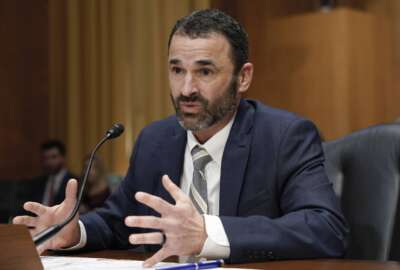Hubbard Radio Washington DC, LLC. All rights reserved. This website is not intended for users located within the European Economic Area.
IRS severing ties with firm amid $500 million in questionable contracts
The Internal Revenue Service said Wednesday it is seeking to cut its business relationship with a firm that may have had inside access to the agency's procureme...
wfedstaff | April 17, 2015 5:10 pm
The Internal Revenue Service said Wednesday it is moving to cut ties with a favored software vendor after learning that one of the agency’s top procurement officials had improper contact with the firm’s owner, one of a handful of troubling revelations Congressional investigators have uncovered about the company.
The firm in question, Strong Castle, Inc., is at the center of separate investigations by the Treasury Inspector General for Tax Administration and the House Oversight and Government Reform Committee. Both have been probing allegations that the IRS’ deputy director for IT acquisition, Greg Roseman, gave preferential treatment and inside information to Strong Castle’s owner, who the committee called a longtime friend of Roseman.
Witnesses also claimed Strong Castle engaged in fraud to win its contracts, though evidence the investigations have publicly produced to date suggest the company’s activities fell within at least the letter of the law, if not its intent.
The IRS told congressional investigators Monday that it was troubled by the allegations, but needed to keep at least one of its large contracts with Strong Castle because it provided a subscription for mission-critical IBM software. The agency’s posture changed abruptly when the oversight committee revealed in a preliminary report on Tuesday that it had obtained records of hundreds of contacts between the two men’s personal cell phones, including dozens of calls and text messages in the days leading up to one major IRS IT acquisition.
Rep. Tammy Duckworth, an Army veteran, questions Strong Castle, Inc., President and CEO Braulio Castillo, about his company’s status as a service-disabled, veteran-owned small business.
“Let me be clear. These types of communications should not occur between a procurement employee and a contractor,” Beth Tucker, the deputy IRS commissioner for operations support testified at a hearing Wednesday. “We expect all of our employees to act with professionalism and integrity.”
Strong Castle had $500 million relationship with IRS
Tucker said the content of the text messages and emails, which revealed not just an overly-cozy relationship but also numerous homophobic slurs, prompted IRS officials to begin looking Tuesday for ways to terminate its relationship with Strong Castle, which, all-told, has a ceiling value of approximately $500 million.
She said Roseman should have disclosed the friendship and recused himself from any procurement decisions involving the company. Instead, he appears to have successfully concealed the friendship from his IRS coworkers.
“Mr. Roseman was repeatedly asked by his superiors if he had a personal relationship with Mr. Castillo and Strong Castle, and he denied it. I believe the detail that we saw in the report has raised considerable concern, and we’re in the process of separating our relationship with Strong Castle,” she said.
Roseman was also present at the hearing, but refused to testify and responded to all questions by invoking his Fifth Amendment right against self-incrimination.
Braulio Castillo, Strong Castle’s president and CEO, did testify. And committee members say to his credit, he has fully cooperated with the investigation, taken part in hours of interviews and turned over large volumes of documents, emails and text messages.
He also says he and his wife, the company’s owners, have done nothing wrong.
“We have never received any preferential treatment, and we have competed fairly for every contract we’ve ever received,” he said. “We have made meaningful contributions to IRS missions and offered the government cost-effective solutions to very difficult problems.”
Small Business Association revokes HUBZone certification
Notwithstanding Castillo’s alleged insider knowledge of IRS procurements, the committee’s investigation showed other agency officials were eager to award contracts to his company for other reasons: Strong Castle was certified as a both a service-disabled, veteran-owned small business and a HUBZone business, so making awards to the firm would let the IRS count procurement money it awarded to the firm against two of its annual high- priority contracting goals at once.
But the oversight committee found significant issues with both of those designations.
On the HUBZone question, the Small Business Administration did as well and revoked Strong Castle’s certification last month.
To earn it in the first place, the company established its corporate headquarters in a small office in Washington’s Chinatown, but Castillo acknowledged that none of the people managing the company’s day-to-day operations actually worked there.
The only people who did, investigators found, were a group of students from Catholic University who also lived in economically disadvantaged areas that were also designated as HUBZones. Castillo recruited them by contacting the school’s football coach, his former college roommate.
“The witnesses made it pretty clear to our investigators that none of the people with real money go there,” said Rep. Darrell Issa (R-Calif.), the oversight committee’s chairman. “A few college students show up and surf the Internet looking for new contracts, and we were scoring this as a positive impact to blighted communities when that score was, at best, fraudulent.”
It was fraudulent, Issa said, not just because the company doesn’t appear to have had any significant business activity in the HUBZone, but also because the IRS was able to take credit toward its HUBZone contracting goals for the entire amount of the award, even though in one case, 98 percent of the money involved in the more than $200 million contract for IBM software went to IBM itself, not Strong Castle.
“Our indication is that this contract cost more than it would have if it would have just been competitively bid to the principals,” Issa said. “We get these report cards talking about hundreds of millions and billions of dollars going to these blighted zones that we’re trying to encourage, and hundreds of millions and billions of dollars going to our disabled veterans.”
Strong Castle’s SDVOSB status called into question
And in Wednesday’s hearing, committee members spent significant time examining and deriding the process by which Strong Castle earned its status as a service- disabled veteran-owned small business (SDVOSB) in the first place.
Castillo’s military service consisted of one year as a redshirt football player at the U.S. Military Academy’s prep school, where he received an injury to his foot, sidelining him for several weeks. He went on to play four more years of football in college, but 20 years later, managed to earn a 30 percent disability rating from VA because of the football injury, which he then leveraged into SDVOSB status for his company.
Several members of the committee had problems with that designation, but none more than Rep. Tammy Duckworth (D-Ill.), an Army veteran who lost both her legs and had one arm severely wounded when the helicopter she was co-piloting was hit by a rocket-propelled grenade in Iraq.
“Does your foot hurt today?” she asked Castillo.
“Yes ma’am,” he said.
“Yeah, my feet hurt too. In fact, the balls of my feet burn continuously and I feel like there’s a nail being hammered into my right heel right now, so I can understand pain and suffering and how service connection can actually cause long- term, unyielding, unremitting, unstoppable pain,” she said. “So I’m sorry that twisting your ankle in high school has now come back to hurt you, if also an opportune way for you to gain this status as you try to compete for contracts.”
Duckworth said she also lost most of the use of her right arm and may still have to have it amputated. For that, VA assigned her a 20 percent disability rating.
Castillo expressed gratitude for Duckworth’s sacrifice and pointed out that it’s VA’s responsibility to assign disability ratings, not his. But he said that he believes VA was correct to rate him as 30 percent disabled. And committee members say that while their investigation is ongoing, there’s no clear evidence to date that Castillo or his company violated any laws or regulations.
Breaking the spirit, if not the letter, of the law
But Duckworth said Castillo actively participated in breaking with the spirit, if not the letter of the country’s laws toward preferential contracting by government agencies when he applied for his SDVOSB status.
“My family and I have made considerable sacrifices for our country,” Castillo wrote to VA officials when applying for his status, according to the committee’s report. “My service-connected disability status should serve as a testimony to that end. I can’t play with my kids because I can’t walk without pain. I take twice daily pain medication so I can work a normal day’s worth. These are crosses that I bear due to my service to our great country. I would do it again to protect this great country.”
“I’m so glad that you would be willing to play football at prep school again to protect this great country,” Duckworth said. “Shame on you. You may not have broken any laws, but you certainly broke the trust of veterans. Iraq and Afghanistan veterans right now are waiting an average of 237 days for an initial disability rating, and it’s because of people like you who are gaming the system are adding to that backlog, so that people who are missing limbs and suffering from post-traumatic stress cannot get the help that they need.”
The IRS said Roseman has been reassigned to a position that does not involve contract decisions and that it’s seen no evidence that anyone besides Roseman has been engaged in improper contacts with contractors.
But Tucker said while the agency waits for the final outcome of IG and congressional investigations, it’s also making changes.
“We’re doing a top-to-bottom review of procurement policies and procedures, everything from internal controls to business processes and staffing practices,” she said. “I’ve also asked Treasury to expand its routine assessment of IRS procurement to include a review of small business programs. Based on the troubling information we’ve received, we will also further enhance employee training with regard to ethics, with a focus on gift rules, conflicts of interest, impartiality and the appearance of impropriety and the misuse of official position.”
RELATED STORIES:
HUBZone Empowerment Act (1998)
As VA works to eliminate one backlog, one more might emerge
VA ‘surge’ closes out 97 percent of oldest disability claims
Copyright © 2024 Federal News Network. All rights reserved. This website is not intended for users located within the European Economic Area.
Jared Serbu
Jared Serbu is deputy editor of Federal News Network and reports on the Defense Department’s contracting, legislative, workforce and IT issues.
Follow @jserbuWFED





